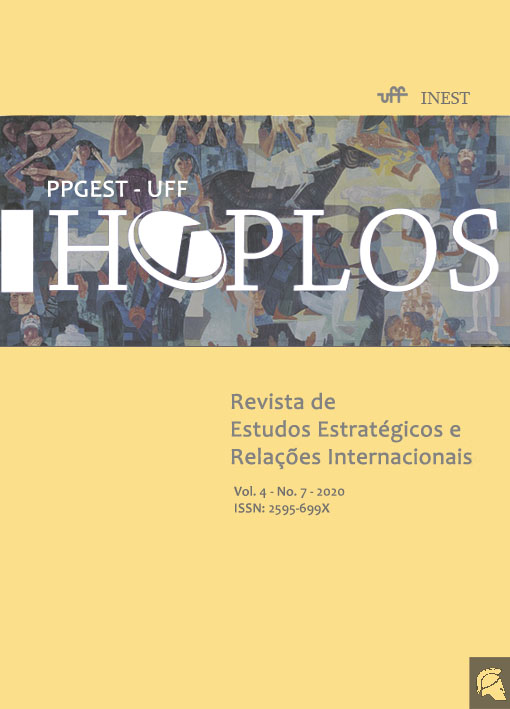O TRIBUNAL PENAL INTERNACIONAL E EMPRESAS MILITARES PRIVADAS: A FALTA DE IMPUTAÇÃO DE RESPONSABILIDADE
DOI :
https://doi.org/10.0000/hoplos.v4i7.42830Mots-clés :
Tribunal Penal Internacional, Empresas Militares Privadas, Direito Internacional HumanitárioRésumé
O presente artigo busca compreender a relação entre as Empresas Militares Privadas e o Tribunal Penal Internacional, órgão integrante do Sistema Internacional de Proteção dos Direitos Humanos. Toma como base as potenciais consequências de descumprimentos das leis de guerra por parte dos funcionários de ditas empresas. Assim, será abordada a constituição do TPI e do Sistema de Proteção dos DH para demonstrar que há a possibilidade desse tipo de julgamento. Entretanto, mesmo já tendo ocorrido violações do direito humanitário por parte dos funcionários das EMPs, nenhum deles já foi julgado. Será demonstrado que isso se dá devido à estrutura do regime de direitos humanos, que dificulta a imputação de responsabilidade em casos que envolvem EMPs; assim como pela própria estrutura interna das empresas que torna mais difícil identificar os responsáveis pelas violações. Por fim, o artigo demonstrará que há uma forte necessidade de alterar esse quadro para que a imputação de responsabilidade não fique somente na possibilidade legal.
Téléchargements
Références
ARNPRIESTER, Natasha. Combating Impunity: the private military industry, human rights and the “legal gap”. Penn Law: Legal Scholarship Repository, 2017.
BRANOVIĆ, Željko. PSD User Manual and Coding Scheme. Agosto 2011.
COMITÊ INTERNACIONAL DA CRUZ VERMELHA. As Três Vertentes da Proteção dos Direitos da Pessoa Humana: Direitos Humanos, Direito Humanitário e Direito dos Refugiados. Abril de 2004. Disponível em: <https://www.icrc.org/por/resources/documents/misc/direitos-da-pessoa-humana.htm>. Acesso em: 11 set. 2019.
DATA ON Armed Conflict, 2011. Disponível em: <https://www.conflict-data.org/psd/Data_Download/index.html>. Acesso em: 21 dez. 19.
DOSWALD-BECK, Louise. Private Military Companies under International Humanitarian Law. In: CHESTERMAN, Simon. LEHNARDT, Chia. FROM MERCENARIES TO MARKET: The rise and regulation of private military companies. Oxford University Press, p. 115-138, 2010.
GASTON, E. L. Mercenarism 2.0? The Rise of the Modern Private Security Industry and Its Implication for International Humanitarian Law Enforcement. Harvard International Law Journal, Vol. 49, N. 1, 2008.
GENEVA CONVENTIONS of 1949. 1949.
GILLARD, Emanuela-Chiara. Business goes to war: private military/security companies and international humanitarian law. International Review of the Red Cross, Vol. 88, N. 868. Setembro, 2006.
ICC. How the Court works. s/d. Disponível em: <https://www.icc-cpi.int/about/how-the-court-works>. Acesso em: 15 out. 2019.
ICC. States Parties – Chronological List. s/db. Disponível em: <https://asp.icc-cpi.int/en_menus/asp/states%20parties/Pages/states%20parties%20_%20chronological%20list.aspx>. Acesso em: 20 nov. 2019.
ICRC. Treaties, State parties and Commentaries: Iraq, s/d. Disponível em: <https://ihl-databases.icrc.org/applic/ihl/ihl.nsf/vwTreatiesByCountrySelected.xsp?xp_countrySelected=IQ>. Acesso em: 21 dez. 2019.
INTERNATIONAL CODE OF CONDUCT ASSOCIATION. The International Code of Conduct for Private Security Company Providers. Genebra, s/d. Disponível em: <https://www.icoca.ch/en/the_icoc>. Acesso em: 02 jan. 20
KEOHANE, Robert. Soberania estatal e instituições multilaterais: respostas à interdependência assimétrica. In: MOISÉS, José. O futuro do Brasil: a América Latina e o fim da Guerra Fria. Rio de Janeiro. Paz e Terra, p. 165-191. 1992.
KEOHANE, Robert Owen. The Demand for International Regimes. International Organization 36, N. 2, p. 325-355. 1982.
LEHNEARDT, Chia. Private military companies and state responsibility. In: CHESTERMAN, Simon. LEHNARDT, Chia. FROM MERCENARIES TO MARKET: The rise and regulation of private military companies. Oxford University Press, p. 139-157, 2010.
O’BRIEN, Kevin A. What should and what should not be regulated? In: CHESTERMAN, Simon. LEHNARDT, Chia. FROM MERCENARIES TO MARKET: The rise and regulation of private military companies. Oxford University Press, p. 29-48, 2010.
PIOVESAN, Flávia. Direitos Humanos e Justiça Internacional: um estudo comparativo dos sistemas regionais europeu, interamericano e africano. São Paulo, Editora Saraiva, 2007.
RITTBERGER, Volker. ZANGL, Bernhard. KRUCK, Andreas. International Organization. 2ed. Palgrave Macmillan, 2012.
ROME STATUTE of the International Criminal Court. 1998.
SIGNER, Peter Warren. Corporate Warriors: the rise of the privatized military industry. Cornell University, 2008.
SINGER, Peter Warren. Corporate Warriors: The rise of the privatized military industry and its ramifications for international security. International Security, Vol. 26, N. 3, p. 186-220, 2001-2002.
TZIKAFIS, Nikolaos. Contracting out to Private Military and Security Companies. Center for European Studies. 2012.
UESSELER, R. Guerra como Prestação de serviços: a destruição das democracias pelas empresas militares privadas SP: Estação Liberdade, 2008.
VULLIAMY, Ed. Has the UN learned lessons of Bosnian sex slavery revealed in Rachel Weiz film? The Guardian, 15 jan. 2012.
WILSON, Jamie; MAGUIRE, Kevin. American firm in Bosnia sex trade row poised to be win MoD contract. The Guardian, 29 nov. 2002.
Téléchargements
Publiée
Numéro
Rubrique
Licence
(c) Copyright Yasmin de Oliveira Guedes 2020

Ce travail est disponible sous licence Creative Commons Attribution - Pas d’Utilisation Commerciale - Partage dans les Mêmes Conditions 4.0 International.
1. PROPOSTA DE POLÍTICA PARA PERIÓDICOS DE ACESSO LIVRE
Autores que publicam nesta revista concordam com os seguintes termos:
a. Autores mantém os direitos autorais e concedem à revista o direito de primeira publicação, com o trabalho simultaneamente licenciado sob a Licença Internacional Creative Commons Attribution - Share Alike 4.0 que permite o compartilhamento do trabalho com reconhecimento da autoria e publicação inicial nesta revista.
b. Autores têm autorização para assumir contratos adicionais separadamente, para distribuição não-exclusiva da versão do trabalho publicada nesta revista (ex.: publicar em repositório institucional ou como capítulo de livro), com reconhecimento de autoria e publicação inicial nesta revista.
c. Autores têm permissão e são estimulados a publicar e distribuir seu trabalho online (ex.: em repositórios institucionais ou na sua página pessoal) a qualquer ponto antes ou durante o processo editorial, já que isso pode gerar alterações produtivas, bem como aumentar o impacto e a citação do trabalho publicado (Veja O Efeito do Acesso Livre).






